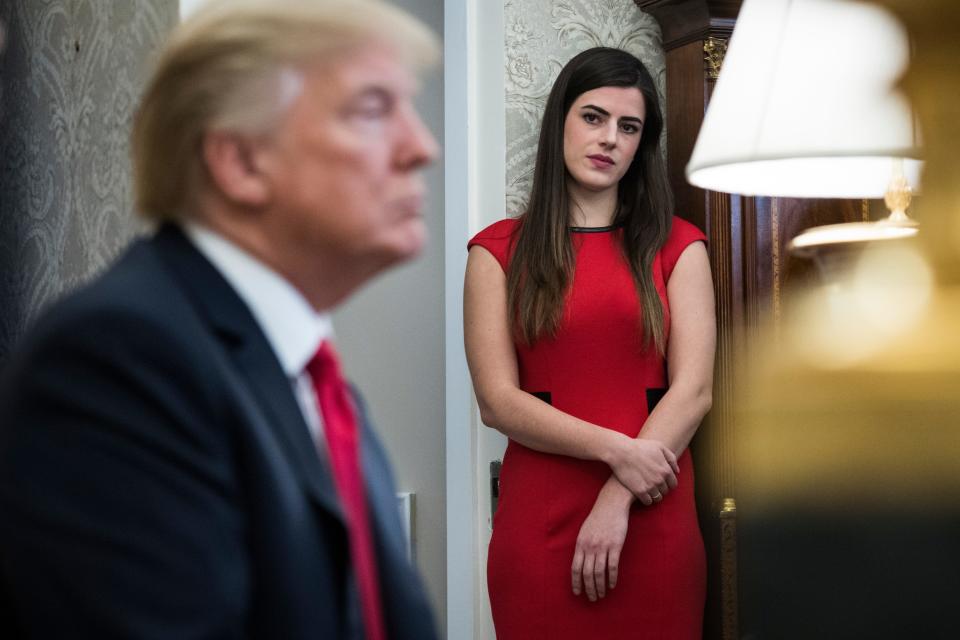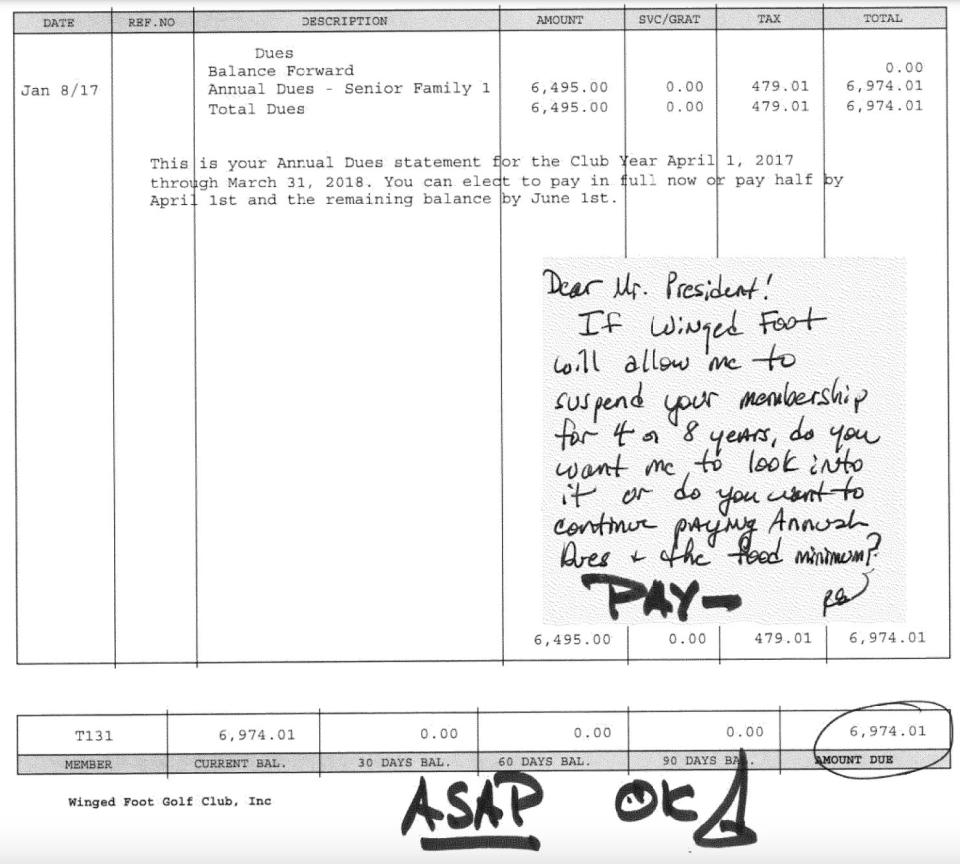Trump's 'multitasking' defense is falling apart in court
- Oops!Something went wrong.Please try again later.
- Oops!Something went wrong.Please try again later.
Trump's lawyers say he was too busy in office to pay attention to his hush-money reimbursement.
But Trump Organization and White House employees say he was discerning about the checks he signed.
And in his books, Trump says he meticulously monitors his finances.
Imagine it's early 2017. You have never held office before. You are now the president of the US. You didn't really expect to win the election, but here you are, at the Resolute desk in the Oval Office.
For decades, you have been in charge of a multibillion-dollar real-estate company run by a staff of about 20 people. And even though you're now the president, you still have to deal with unfinished business. One of your employees in New York sends you a pile of checks to sign.
You have North Korea to worry about. You're paranoid that the FBI director is out to get you. People are talking about Russia. The checks. The checks! What do you do with the checks?
You sign them. You get them mailed back to New York. You have more important things to worry about.
This is one of the arguments former President Donald Trump's lawyers have advanced in his defense for his hush-money trial: Trump didn't do anything wrong. It was Michael Cohen who paid the hush money.
And if Trump's signature was on a few checks? Well, he was trying to run the country and wasn't really paying attention to every check he signed.
The Manhattan district attorney's office has indicted Trump on 34 counts of illegally falsifying business records. Prosecutors say Trump disguised records reimbursing Cohen — then his personal lawyer and a Trump Organization executive — for a $130,000 hush-money payment made to Stormy Daniels in the chaotic final days of the 2016 election.
The purpose of that payment, prosecutors say, was to keep Daniels quiet about an affair she says she had with him, keeping that information away from American voters as Trump's campaign was bruised by the revelations of the "Access Hollywood" tape.
Witnesses have testified and records shown at the trial, held in a chilly 15th-floor courtroom in downtown Manhattan, have indicated Cohen fronted the hush money out of his own pocket in October 2016 using a shell company he created. Trump then reimbursed him, prosecutors say, in a series of 11 checks, nine of them bearing his handwritten signature.
Some of the payments to Cohen came from his personal bank account, others through a Trump Organization account.
Trump's lawyers have sought to pin all the blame on Cohen. In testimony, Trump's former press secretary and aide Hope Hicks said that after The Wall Street Journal in 2018 first published articles about the hush-money arrangement, Trump said Cohen "did it out of the kindness of his own heart" to "protect him" but "never told anybody about it."
When questioning his former employees, Trump's lawyers consistently ask whether he was "multitasking" while signing checks. And under questioning from a prosecutor, Hicks offered that Trump would have a constant flow of people coming in and out of his office.
"He is a very good multitasker and a very hard worker," she said. "He is always doing many things at once."
Trump's attorney Susan Necheles drilled into the question Friday while Madeleine Westerhout, Trump's White House executive assistant who kept a desk right outside the Oval Office, was on the witness stand.
Trump didn't use a computer and requested hard copies of everything. He "felt that if someone was getting his signature, they deserved his real signature," Necheles said.
Westerhout agreed Trump was "a person who multitasked" and signed "commissions, proclamations, executive orders, memos, and other documents" throughout the day.
It wouldn't be unusual, she said, if Trump signed a stack of documents while meeting with members of his administration or even foreign leaders.
To secure a felony conviction, prosecutors need to convince jurors that Trump knew what the money was for: that whenever he signed a check to Cohen, it was for the purpose of reimbursing him for the Daniels hush money.
And while Trump may not seem like the most detail-oriented person, prosecutors say there's something he's always watching: the bottom line.
Trump was discerning about which checks he signed
Trump has made no secret of his parsimoniousness. He has bragged about not paying vendors for his buildings. And he's using political donor money to pay his lawyers.
Prosecutors presented excerpts from Trump's book "Think Like a Billionaire," which includes a chapter titled "How to Pinch Pennies." In it, Trump relays a famous story where he cashed a $0.50 check from Spy magazine, winning its "cheapest millionaire" contest. Every check counts.
"I always sign my checks, so I know where my money's going," Trump says. "In the same spirit, I also always try to read my bills to make sure I'm not being overcharged."
In the book — which defense attorneys were sure to point out was written with the help of a ghostwriter — Trump reflects deeply on budgeting, even musing about the innate ethics of room decorators.
"When you are working with a decorator, make sure you ask to see all of the invoices," Trump writes. "Decorators are, by nature, honest people, but you should be double-checking regardless."
The books that prosecutors presented were written when Trump was a businessman, not yet best known as a political figure. But prosecutors suggest his thoughtfulness about his bills continued into his presidency.
Cohen met with Allen Weisselberg, the now former Trump Organization CFO, in January 2017 to hash out how he'd get reimbursed by Trump and the Trump Organization, according to records shown at trial.
Ultimately, Weisselberg agreed to give Cohen $420,000 in multiple payments over the course of 2017, which would cover taxes and include a bonus, Weisselberg's deputy Jeffrey McConney testified.

When Trump was running the Trump Organization every day, it was easy to get ahold of him in his Trump Tower office to approve expenses and sign checks paying for them.
But with him in the White House, employees had to figure out another way to have him sign off on expenses. They devised a system where they'd cut the checks and print invoices in New York, then FedEx a pile of them to Washington, DC, a few times a month. They'd pass through the hands of Trump's bodyguard turned White House employee Keith Schiller, then make their way to the Oval Office. Trump would review and sign them, then send them back to Manhattan — all with the logistical assistance of taxpayer-funded government employees.
But Trump didn't automatically put his signature on every check. Occasionally, he'd write "VOID" on one he didn't want to be paid, the Trump Organization employee Deborah Tarasoff said.
"It was signed in a Sharpie in black," Tarasoff testified. "That is what he usually uses."
While Trump was making life-or-death decisions in the Oval Office, the billionaire was also discerning about trivial-seeming expenses. Prosecutors presented an invoice from the Winged Foot Golf Club, north of New York City, for Trump's dues that was sent to the White House from New York. Rhona Graff, his executive assistant at the Trump Organization, asked whether he wanted to suspend his membership for four years — or "continue paying annual dues + the food minimum."
Trump wrote in felt-tip pen, "Pay- ASAP OK," and signed, "D."

"This was included in the stack of checks, so I passed it along," Westerhout, Trump's White House executive assistant in 2017, testified at the trial.
Westerhout didn't send back every single check to the Trump Organization. Sometimes, Trump didn't pull out his Sharpie (sometimes a Pentel felt-tip pen, she testified) to sign them.
Rebecca Manochio, the bookkeeper at the Trump Organization who was first to handle the checks when they came from the White House, testified that sometimes checks would be missing. When that happened, she checked with Westerhout.
"Either it got lost, or he had questions about it, and he had to speak to someone," Manochio said.
If Trump had a question about a check, he'd talk with a Trump Organization employee about it, Westerhout testified.
"I think I remember, maybe, a couple times him having a question about a check and then calling Allen Weisselberg or somebody else in the Trump Organization to ask for clarification," she said.
Graff, for her part, testified that "it wasn't unusual" to see Trump on the phone while signing checks.
"Am I correct that when he would sign checks, he was often multitasking?" Necheles asked her.
"It happened on occasion," Graff said. "It would depend what was going on at the moment and how important the checks were that needed to be signed."
Trump — now a commensurate multitasker as he defends himself from multiple civil and criminal cases — employed a similar legal defense in his civil fraud case last year, where the New York attorney general's office accused him and his company of fudging numbers to commit insurance, bank, and tax fraud.
In a deposition, Trump said he was too busy saving the world "from a nuclear holocaust" to be paying close attention to the Trump Organization's finances.
The judge in that case didn't buy the argument, ultimately ordering him to pay nearly half a billion dollars in penalties.
Trump perhaps said it best himself.
In the trial, prosecutors have trotted out passages about his thriftiness from several of his books.
You can negotiate every bill, even when shopping at "high-end shops," he once wrote. You need to watch out for "computer error" in billing, he says. The only solution, he says, is to personally review and sign "as many checks as possible."
"When you sign a check yourself, you're seeing what's really going on inside your business," Trump writes in one book. "And if people see your signature at the bottom of a check, they know you're watching them, and they screw you less because they have proof that you care about the details."
Correction: May 13, 2024 — An earlier version of this story misspelled the name of a Trump Organization employee who testified at the criminal trial. It's Deborah Tarasoff, not Tarassoff.
Read the original article on Business Insider

